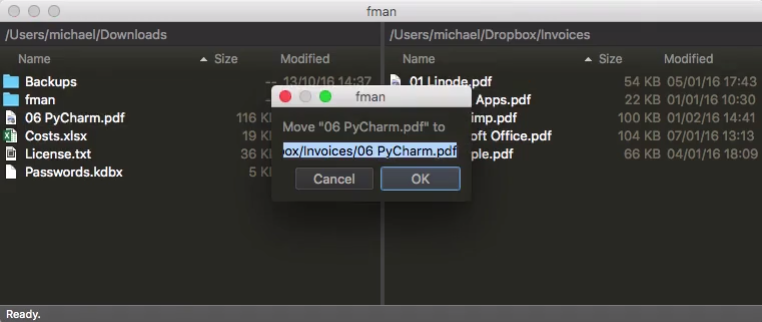Fman is a lightweight dual-pane file manager for Windows, Linux and OS X.
Fman's key difference to similar programs is it's almost entirely keyboard-powered. There's no menu bar, no toolbar, no right-click menu for files, no clickable buttons to switch drives. You can't even multi-select files with the usual mouse-click plus Ctrl or Shift modifiers-- they're selected and deselected with the space bar.
The down side of this approach is you can't just install the program and use it immediately. It takes time to learn how everything works, and if you prefer the mouse to keyboard shortcuts fman will only ever be annoying.
Fman does have some pluses, though, starting with the clean interface. There's no ribbon to get in the way, no dialog boxes to navigate, no click this/ click that cascading menus. Once you understand the keyboard shortcuts you can delete, copy or move your files around far more quickly and efficiently than with Explorer alone.
The easiest way to get started is to view the commands palette (Ctrl+Shift+P). This lists the various commands fman supports, and their hotkeys: Copy (F5), Move (F6), Open (Enter), Delete (Del), Rename (Shift+F6), Create folder (F7), Copy to clipboard (Ctrl+C), Copy paths to clipboard (F11), Open terminal (cmd.exe in Windows) at current folder (F9), Open native file manager (F10), and more.
This list is useful, but it also points to how annoying fman can be for mouse fans. You can select "Open terminal" in the Command Palette with the mouse, for instance, but double-clicking won't run that action, and you can't click away from the command palette to make it disappear, as you would with regular Windows context menus. You have to hit Esc to make it go away.
If you prefer a keyboard-oriented approach you might not even notice the lack of mouse support, though, and instead you can start extending fman with its selection of plugins. There are only a few of these, but some make fman easier to use and add some handy advanced extras (navigating folder with the arrow keys, duplicating the current folder on demand, uploading a file and getting a shareable link for it, selecting all files that match a regular expression).
Please note, fman is a shareware package. The download never expires, but it displays a nag screen on launch, and the only way to remove this is by purchasing a licence (priced from 14 Euros).
What's new in 1.6.7 (see changelog for more)?
- You can now use Themes to change the font color in the location bar
Verdict:
Fman isn't for everyone. You can't just use it right away, it isn't interested in Windows conventions, there's barely any mouse support, much of the program won't work as you expect.
But if you can live with the keyboard-only approach and take the time to learn the basics, you'll find you can work quickly with fman, it's quite configurable, can be extended in various ways, and runs happily on your PC, Mac and Linux systems.





Your Comments & Opinion
Cross-platform, open-source dual-paned file manager with extras
Cross-platform, open-source dual-paned file manager with extras
Cross-platform, open-source dual-paned file manager with extras
A dual-panel file manager for Windows
A powerful, portable alternative to Windows Explorer
Read, write and edit metadata in more than 130 file types with this command line tool
Read, write and edit metadata in more than 130 file types with this command line tool
Read, write and edit metadata in more than 130 file types with this command line tool
Automatically adjust your monitor settings to reduce eye strain
A powerful tool for detecting, benchmarking and monitoring your PCs hardware